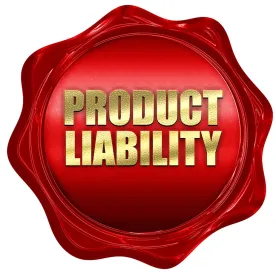RETAIL INDUSTRY 2021 YEAR IN REVIEW
Introduction
The Consumer Product Safety Commission (CPSC) ramped up its enforcement efforts in 2021, raising regulatory and litigation risk for the retail industry. 2021 saw the return of civil penalties after a two-year hiatus, and also brought the first-ever criminal prosecution of a company for failure to report a product defect under the Consumer Product Safety Act (CPSA). The CPSC also facilitated over 220 voluntary recalls over the course of 2021—slightly less than its historic average, but still in line with expectations particularly given ongoing administrative delays caused by COVID-19.
The highest-profile CPSC action of the year was its public spat with Peloton over its refusal to recall its Tread+ machines. The CPSC’s handling of the Peloton issue suggests that the agency may now CPSC’s Aggressive Enforcement in 2021 Signals Increased Regulatory and Product Liability Risk for Retail Industry expect companies to report patterns of customer misuse or disregard of warnings as “product hazards.”
The CPSC’s reinvigorated—and ultimately less predictable— approach to enforcement should be on every retailer’s radar heading into 2022.
The CPSC’s 2021 Civil Penalties and Historic Criminal Penalty
Following a nearly two-year drought in civil penalties, in January 2021 the CPSC issued a $12 million penalty against Walter Kidde Portable Equipment for failure to report alleged defects in fire extinguishers.1 In February 2021, Cybex International was hit with a $7.95 million fine for failure to report alleged defects in two of its exercise machines.2
The most significant penalty news of 2021, however, was the first-ever corporate criminal prosecution in the nearly 50-year history of the CPSA. The Department of Justice announced on October 29, 2021, that Gree Electric Appliances’ United States subsidiary agreed to plead guilty to one felony count for willfully failing to report a defect in its humidifiers, which allegedly caught fire. The Gree defendants agreed to pay more than $91 million in criminal fines and provide restitution to victims of fires caused by the humidifiers. Two Gree executives have also been criminally charged and await trial.
The CPSC’s Aggressive Unilateral Product Safety Enforcement in 2021
The CPSC has long cast itself as a cooperative partner in product safety, working with companies to issue joint press releases regarding recalls and offering flexibility to companies that have attempted to meet their reporting obligations in good faith. But that image has shifted in recent years as the CPSC has more frequently made public its disagreements with certain companies over the handling of product safety issues.
In April 2021, for example, the CPSC issued a unilateral warning to consumers to stop using Peloton’s Tread+ following reports of a toddler’s death. After the CPSC issued its warning (including actual video of a child being sucked under the machine), Peloton publicly accused the CPSC of being “inaccurate and misleading.” Less than two weeks later, Peloton 2021 Retail Industry Year in Review 15 announced that it “made a mistake” and issued a recall. In effect, the unilateral warning allowed the CPSC to control the narrative and forced Peloton to defend itself in the court of public opinion.
The Peloton dispute also suggests that the CPSC may now be looking differently at what constitutes a “reportable defect.” Peloton initially defended its decision not to recall the Tread+ by pointing to its very clear warnings to keep children and pets away from the machine. But the CPSC’s treatment of the Peloton issue suggests that the agency believes that a pattern of consumer misuse or disregard for a warning nevertheless constitutes a reportable product hazard.
The CPSC’s view of pervasive product misuse as a “product hazard” was also on display in September 2021 when the agency announced the voluntary recall of more than 3 million “Boppy” infant loungers following reports of eight infant deaths. The loungers were never marketed as infant sleep products and included warnings against such use, but parents still used the products as sleep products. Despite the disregard for Boppy’s explicit warnings, the company and the CPSC agreed that the products should be recalled—suggesting that the CPSC’s enforcement focus may be on “reasonably anticipated” uses, not simply advertised uses.
Looking Ahead to 2022 and Beyond
Heading into 2022, we expect civil penalties to once again become the norm for the CPSC. Less certain is whether the Gree prosecution signals a CPSC appetite for increased criminal enforcement or merely a unique circumstance of historically egregious conduct. That said, in November 2021, CPSC Commissioner Peter Feldman issued a public statement expressing concern that the civil penalties authorized by the CPSA “may leave CPSC with insufficient tools to enforce against large e-commerce platforms, some of which measure their annual revenue in the hundreds of billions of dollars.”3 If other commissioners share this view, they may increasingly lean on criminal prosecution and penalties to put pressure on larger companies.
Following the Peloton and Boppy recalls, the retail industry should also be aware that injuries caused by a consumer’s disregard for even clear and explicit warnings may be reportable. This approach challenges traditional notions of reportability and should prompt all companies—even those with robust compliance programs—to look closely at how they track and evaluate product incidents.
Finally, companies should understand that increased CPSC enforcement will raise the risk of product liability litigation in 2022 and beyond. Lawsuits quickly followed Peloton’s public dispute with the CPSC. In the months since the recall, Peloton has been named in at least three personal injury suits involving injuries to children.4 Peloton also faced a consumer class action (which has since settled) alleging that Peloton’s advertisements falsely indicated to consumers that the product was safe to use around children.5 Plaintiffs’ lawyers often seek to equate a recall with proof of a defect in front of a jury—or look to characterize a company as a “bad actor” in the case of a delayed report. In short, where the CPSC goes, plaintiffs’ lawyers tend to follow as they look to capitalize on large pools of plaintiffs.
FOOTNOTES
1 United States v. Walter Kidde Portable Equipment Inc., No. 1:20CV208 (M.D.N.C. Jan. 4, 2021).
2 In re Cybex Internat’l, Inc., CPSC Docket No. 21-C0001, Settlement Agreement (Feb. 11, 2021).
3 https://www.cpsc.gov/about-cpsc/Commissioner/Peter-A-Feldman/Statement/Statement-of-Commissioner-Peter-A-Feldman-New-Penalty-Caps-May-Provide-Insufficient-Deterrence-Against-the-Largest-E-Commerce-Platforms
4 See Saadoun v. Peloton Interactive, Inc., No. 516118 (NY Sup. Ct. July 1, 2021); Greene et al. v. Peloton Interactive Inc., No 4:21-cv-00215 (N.D. Fla. May 25, 2021); Williams v. Peloton Interactive, Inc., No. 4:21-cv-2525 (S.D. Tex. August 5, 2021).
5 Albright v. Peloton Interactive, Inc., No. 3:21-cv-02858 (N.D. Ca. April 20, 2021).





 />i
/>i

